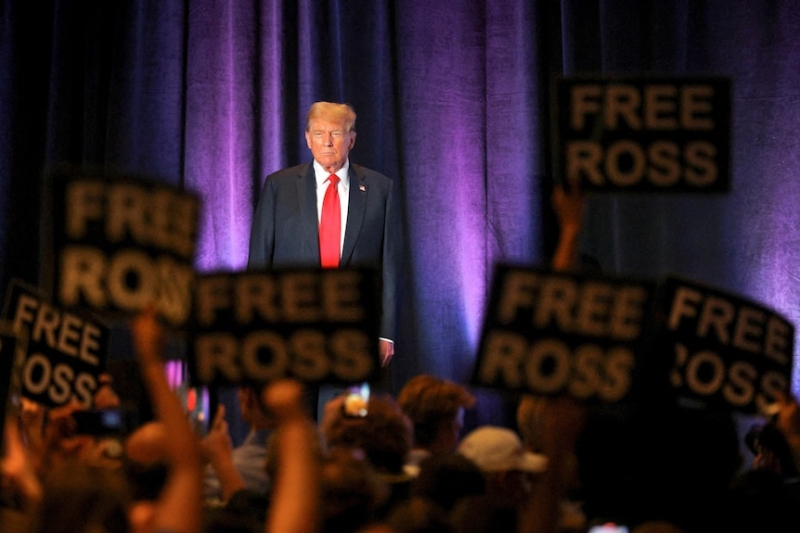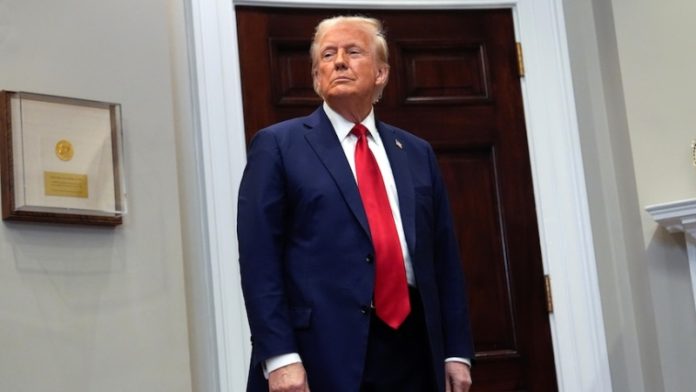During his first full day as the 47th president of the United States, Donald Trump announced a formal pardon for Ross Ulbricht, the creator of the underground illicit drugs marketplace Silk Road. (AP: Julia Demaree Nikhinson)
United States President Donald Trump declared a pardon for the founder of the underground illicit drugs marketplace Silk Road as part of a raft of sweeping announcements during the first two days of his new administration.
Ross Ulbricht was sentenced to life in prison in 2015 after a high-profile prosecution that highlighted the role of the internet in illegal markets.
Look back on our blog to see the events of Donald Trump's first days into his second term.
Mr Trump on Wednesday said in a post on his social media platform Truth Social that he had called Ulbricht's mother to deliver the news of his pardon.
"The scum that worked to convict him were some of the same lunatics who were involved in the modern day weaponization of government against me," the president said.
"He was given two life sentences, plus four years. Ridiculous!"
Mr Trump had previously promised to help free Ulbricht during a speech in May last year at the Libertarian Party National Convention.
Libertarian activists, who generally oppose criminal drug policies, have long believed that US government investigators overreached in building their case against Silk Road.
"Ross Ulbricht has been a libertarian political prisoner for more than a decade," a statement from Libertarian National Committee chair Angela McArdle said.

Ross Ulbright was sentenced to life in prison in 2015 after being convicted of crimes including the distribution of dangerous drugs, conspiring to commit computer hacking and money laundering. (Reuters: US Attorney's Office for the Southern District of New York)
"I'm proud to say that saving his life has been one of our top priorities and that has finally paid off."
So, what was the Silk Road marketplace and why has Mr Trump only now decided to pardon Ulbricht?
What was Silk Road and who is Ross Ulbricht?
In 2015, the Federal Bureau of Investigation (FBI) described Silk Road as "a hidden website designed to enable its users to buy and sell illegal drugs and other unlawful goods and services anonymously and beyond the reach of law enforcement between January 2011 and October 2013".
The site was created in February, 2011 and also traded illegal weapons, hacking tools and tutorials and offered hit men for hire on the "deep web" for thousands of customers, which generated up to $US1.3 billion ($2.07 billion) in sales according to the FBI.
"Silk Road has emerged as the most sophisticated and extensive criminal marketplace on the internet today," FBI agent Christopher Tarbell said in a criminal complaint lodged by the agency in 2013.
The FBI said Ulbricht operated Silk Road on "what is known as 'The Onion Router,' or 'Tor' network, a special network of computers on the Internet … designed to conceal the true IP addresses of the computers on the network and thereby the identities of the networks' users".
Read more on US politics:
- Analysis: Donald Trump's toughest opposition is emerging outside Washington
- Why Donald Trump pardoned the Silk Road creator a decade after his life imprisonment
- Can Trump take back control and rename the Panama Canal
- You might be following Trump on social media without meaning to
- Key moments from Donald Trump's return
The cryptocurrency Bitcoin was used for payments to provide a second layer of anonymity for customers looking to buy the almost 13,000 listings on the website, which were linked to at least six overdose deaths across the world, according to officials in the US.
Ulbricht, who holds an advanced degree in chemical engineering, at times used computers at internet cafes to access the servers running Silk Road and used the online alias "Dread Pirate Roberts" to conceal his own identity.
The Silk Road platform was shut down in 2013 with the arrest of Ulbricht.
In 2015, the then-31-year-old was found guilty and convicted of seven crimes including the distribution of dangerous drugs, conspiring to commit computer hacking and money laundering.

Donald Trump first signalled during a rally in May, 2024 that he would look to help free Ulbricht, amid an ongoing 'Free Ross' campaign sparked by his imprisonment a decade earlier. (Reuters: Brian Snyder)
He was sentenced in a Manhattan federal court to a lifelong jail term and ordered to forfeit $US183,961,921.
During his four-week trial, Ulbricht acknowledged he created Silk Road, but his lawyers contended he had later handed off the website to others and was lured back toward its end to become the "fall guy" for its true operators.
"I wanted to empower people to make choices in their lives and have privacy and anonymity," Ulbricht said at his sentencing hearing in 2015.
Monica Barratt, a criminal and justice studies and drugs policy expert from RMIT university, first started researching the Silk Road marketplace in 2011 and said she quickly noticed some of the ideals demonstrated by Ulbricht online.
Inside life on the darknet
Photo shows A laptop computer sits open on a bed in a dark room showing an email account on screen.

"[He] was a very keen libertarian. There was a book club, there was all this material about libertarian ideas and ideal and philosophies that Ross himself would lead these discussion around libertarianism," Dr Barratt told the ABC.
"That was a strong theme of Silk Road and I think that has played into the sorts of people that Donald Trump has been trying to get on-side during his campaign to become president.
"Now he's been successful, and he's following through on some of his promises."
Why did Donald Trump pardon Ross Ulbricht?
Dr Barratt said that since Ulbricht was jailed in 2015, a "Free Ross" campaign has vocally been advocating for his release that has recently become entwined with Mr Trump's desire to create a more libertarian society in the US.
She also said that the Ulbricht campaign has aligned with Mr Trump's proximity to tech and cryptocurrency allies like Elon Musk.
"The kind of connections between the libertarians and cryptocurrency … were the way that Silk Road operated and the way that dark net markets that arose after Silk road was shut down by the FBI were operating.
"In terms of his connections — that is Donald Trump — with Elon Musk and many other people, who I think you could call tech bros, that's certainly not a secret that he has alliances with those kinds of groups."
Mr Trump's interest in freeing the person behind a marketplace for dangerous and illicit drugs have, however, flown in the face of comments he made just hours before pardoning Ulbricht.
Earlier on Tuesday, local time, the president delivered a scathing rebuke of countries like Canada, Mexico and China — who he accuses of facilitating the import of large amounts of the dangerous drug fentanyl into the US.
Mr Trump wants to impose tariffs of up to 10 per cent on China and up to 25 per cent on Canada and Mexico for the alleged influx of the drug across the US border.
"Donald Trump is full of contradictions," Dr Barratt said.
"He seems to have no trouble saying what he needs to say to the people he's speaking to and, in a matter of minute or hours, he says what he needs to say to the people he's talking to at that time and those two things might be in direct contradiction.
Why was Silk Road's shutdown so significant and what happens now?
Dr Barratt's research of Silk Road focused on the individuals using the first-of-its-kind deep web platform to buy illicit drugs and the social impacts it generated.
A decade after Ulbricht's imprisonment, she says there were some benefits of the website for people who used it as a substitute for locating and buying drugs elsewhere.
"They could avoid the often violent and unpredictable situations that people get into when they have to engage with people face to face," she said.
"That sort of evidence was very much dismissed by the judges [in Ulbricht's trial]. They were very keen to say that everything that Ross had done was all entirely harmful."
Despite that, Dr Barratt also said that the death of Silk Road fundamentally shifted illegal drug trades on the deep web by sparking dozens of copycat websites.
"There was one huge marketplace and then four weeks later there were 20. It was cutting off the snake's head and then there were 20 heads — the Hydra situation," she said.
Dr Barratt says there is not yet any proof that Ulbricht's release from prison will result in a renewed Silk Road website, or an emboldened push towards more online illicit drugs marketplaces.
"I don't know what Ross is going to do. He might want to be a recluse, he might not. He might decide he wants to have a public profile.
"There are many, many dark web markets that arose out of Silk Road's ashes in 2013.
"Whether or not there's going to be some major change in the ecosystem of dark net markets with what's happened with Ross. It's not something I think we can answer at this point, but definitely a 'watch this space.'"
ABC/Reuters/AP

